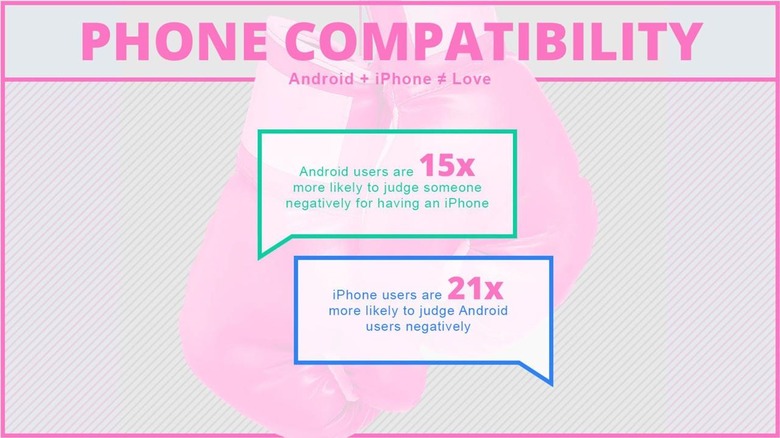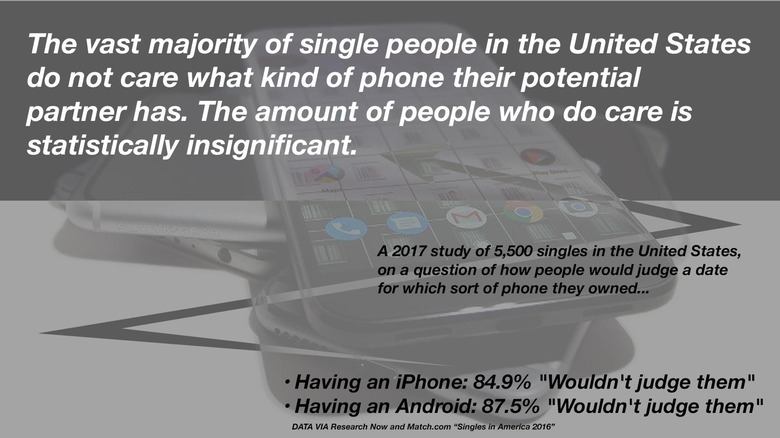Android Or iPhone? Won't Matter On A Date, Says Study
Today we're having a look at a study conducted by Research Now and Match dot com. With the help of Dr. Helen Fisher, PhD, and Dr. Justin R. Garcia, PhD, they surveyed over 5,500 "singles" from all walks of life from inside the United States, asking them all sorts of questions – mostly about dating. We got our hands on the raw data behind the study and have some conclusions that smartphone users are probably going to want to see.
Users in this study were fairly evenly matched when it came to owning an iPhone or an Android phone. Approximately 39.6-percent of respondents had an iPhone, while 40.6% had an Android phone. And 17.2% didn't own a smartphone at all, believe it or not.
The majority of the people responding to this were between 18 and 35. Around 56% of respondents said they were women, and 43% said they were men. Also possibly relevant was the sexual orientation question, which had 87.6% of respondents saying they were straight or heterosexual, while just 6.8% said they were homosexual, gay, or lesbian, and 4.3% suggested they were bisexual.
Judgement of Hardware and Software
The public face of this study shows some graphics which suggest that owning a certain brand or type of phone enacts a reaction in people on dates. They go so far as to say that more iPhone users judge their date negatively if they own an Android phone, for example. Their actual study numbers say something different.

ABOVE: Graphic from the study's collection if conclusions. BELOW: Using the same data, we've come up with our own conclusions. They're not exactly contradictory, but relevance changes.
The following subject matter is followed by the single category in which the most vast number of respondents responded. We noticed a trend immediately. People would judge someone, they said, based on the following things on their phone:
• The type of case they had: 92.5% "Wouldn't judge them"
• Not having a case: 91.3% "Wouldn't judge them"
• Cracked screen: 82.4% "Wouldn't judge them"
• Having an iPhone: 84.9% "Wouldn't judge them"
• Having an Android: 87.5% "Wouldn't judge them"
• Having an older model phone: 89.9% "Wouldn't judge them"
• Having audible clicks on when typing: 82.8% "Wouldn't judge them"
• Having a novelty ringtone: 85.7% "Wouldn't judge them"
• Having a standard/default ring tone: 91.7% "Wouldn't judge them"
• Their lock screen background or photo: 90% "Wouldn't judge them"
• Having a super large phone font: 90.8% "Wouldn't judge them"

On a first date with someone you like
A surprising 31% of people in this study suggested that on a first date with someone they like, texting someone "wouldn't worry" them. A combination of "turned off" and "extremely turned off" by that same sending of a text message racked up a cool 65.7% of respondents. Don't go sending text messages on a first date out of the blue!
Reading "the occasional text", on the other hand, doesn't seem to offend people on a first date quite as much. The "wouldn't worry me crowd" here was about 40% of respondents. Turned off and extremely turned off added up to 57.9% – so it's probably still not a great idea to do any texting of any sort, reading or writing.
Another "oh god don't do that" sort of situation seems to be placing one's phone face up on a table to see notifications. 58.4% of respondents would be turned off or extremely turned off by their first date doing this sort of thing. On the other hand, 38.4% of people wouldn't care.
It would appear that the best thing any person on a first date could do with their phone is visibly turn it off. Specifically and pointedly – turn it off. While 45.7% of respondents didn't seem to care especially about this move, 44.5% suggested that they'd be turned on by their date turning their phone off.
Verdict
The numbers in this study show that on a first date, the vast majority of people in the United States will not care one lick about smartphone hardware or software. How the person uses said smartphone – that's a different situation. While some people might judge others on the sort of phone they own or whether or not their display glass is cracked, these aren't the sort of people that make up any significant majority – not even close.
